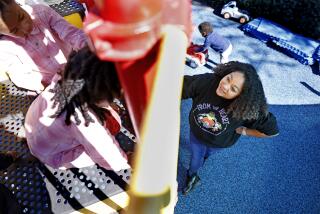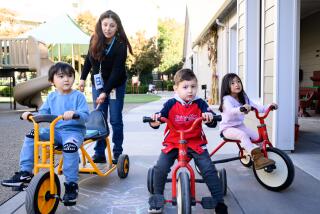Day-Care Study Intensifies Ambivalence of Parents
- Share via
For some parents this was just the kind of news that added anxiety to an already hectic morning: a national study saying that the child you are about to drop off at day care may be more disobedient and aggressive in kindergarten the more time he spends in day care.
“I totally disagree,” said working mom Kimberly Killgore, 34. “Who did this study? I would not stay home based on this.”
For other parents, the findings from an expansive national study on the effects of child care was just the kind of news that brings joy to their hearts.
“Oh, it’s all so true,” said stay-at-home mom Sarah Green, who used to be a kindergarten and first-grade teacher. “You can’t deny the behavior patterns. We used to call them ‘the day-care kids’ because of the way they behaved.”
There are few topics that inflame passions, tug at the heart and provoke arguments as much as the issue of how we care for our children.
The release of the study on day care by the National Institute of Child Health and Human Development ignited discussions and debate Thursday on the airwaves and in offices, schools and day-care centers.
At times, emotions flared as parents explained why their decisions about child care are the right ones, based on what’s best for their children.
Thea Bien, who leaves her 2-year-old with a nanny to go to her job as a marketing manager in Costa Mesa, said her daughter is learning to be more independent, while she herself gets tremendous satisfaction from her work--which, in turn, makes her a happier mother.
“There is definitely some guilt, but it is mixed with knowing this is the best thing for you and your child,” she said. “As a mom, there is no one who is going to love your child as much as you do, but there’s also an opportunity for bringing about more individuality in kids.”
The government-sponsored study found that the more time children spent away from their mothers--whether in child care or under the care of nannies or relatives, even dads--the more aggression, disobedience and other behavior problems they exhibited in kindergarten. These problems included everything from assertiveness to bullying and fighting.
The researchers--who even squabbled among themselves about the implications of their findings--could not say what caused the behavior differences. One investigator said the stresses in the lives of working families could contribute to the problems, more than day care itself.
Kristine Maji of Costa Mesa said she agrees with the findings. She quit her job as a manager for a clothing company when her daughter, now 2 1/2, was born.
The first year was emotionally and economically difficult, Maji said. Before the family bought a second car, she would walk to the grocery store and load the bags into the bottom of her daughter’s stroller. And she missed having a life outside the home.
But it’s worth it, she said, and she doesn’t plan to go back to work when her children enter school. “We don’t believe in strangers watching our kids,” Maji said. “I want to be able to pick them up from school.”
Joan Lombardi, a child- and family-policy specialist who once headed the child-care bureau of the U.S. Department of Health and Human Services, said the survey could serve as a much needed wake-up call.
At a time when many parents work out of economic necessity, not choice, and three out of every five children are in child care, she said, “the country has to pay attention to the quality of care.”
*
Times staff writers Jessica Garrison, Noaki Schwartz and Erika Hayasaki and researcher Maloy Moore contributed to this report.
More to Read
Sign up for Essential California
The most important California stories and recommendations in your inbox every morning.
You may occasionally receive promotional content from the Los Angeles Times.














